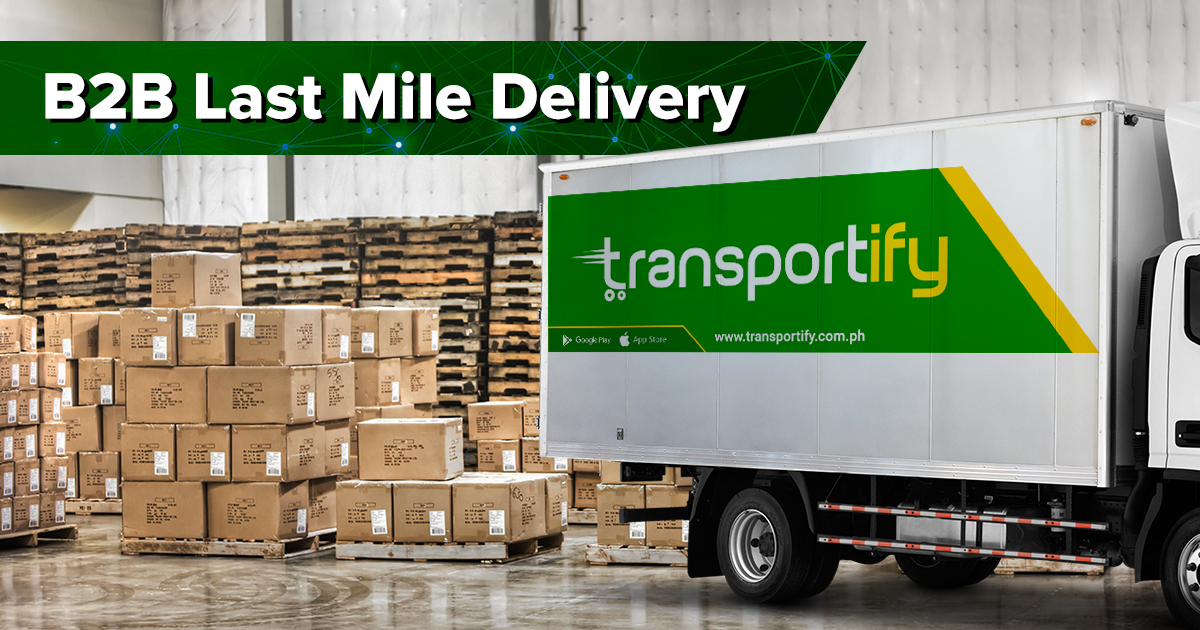
In the realm of B2B last mile delivery, time is unequivocally of the essence. Every second counts, and companies must harness their resources to ensure they meet their customers’ needs punctually. Navigating the intricacies of the B2B last mile delivery process can be challenging. However, with the right strategies in place, you can streamline and optimize this crucial aspect of your business. In this blog post, we’ll delve into key strategies that businesses can leverage to optimize their B2B last mile delivery process.
What Happens in B2B Last Mile Delivery?
Firstly, let’s clarify what we mean by “last-mile logistics.” This term refers to the supply chain process that delivers goods from their final transit stop to the ultimate receiver. It’s the stage where products reach their final destinations, in contrast to port-to-port or terminal-to-terminal logistics. Road transportation forms the core of B2B last mile delivery, often posing the most significant logistics challenges for businesses to navigate.
In the B2B landscape, buyers now expect a level of seamless delivery that’s akin to their experiences as consumers. In a survey conducted by the Capgemini Research Institute, over half of the respondents expressed their willingness to switch to brands that offer faster deliveries. While B2B logistics may come with a substantial price tag, the complexities involved justify the cost.
How Crucial Is B2B Last Mile Delivery in Building Supplier and Buyer Relationships
It’s worth noting that B2B last mile delivery can significantly impact the success of suppliers in today’s highly competitive marketplace. To stay competitive and meet the expectations of their clients, B2B logistics providers need to invest in modern solutions like B2B delivery apps or software.
Key Strategies You Should Do To Optimize B2B Last Mile Delivery
Now, let’s explore the strategies that B2B companies can adopt to achieve a high-quality, customer-centric delivery experience akin to that of B2C:
Route Optimization
Route optimization is paramount for cost savings and on-time deliveries. By leveraging this technology, businesses can quickly identify the most efficient route for each delivery, ensuring both cost-effectiveness and punctuality. Furthermore, route optimization empowers fleets to overcome B2B last mile delivery challenges such as adverse weather conditions, roadblocks, and staffing shortages for loading/unloading cargo.
Hybrid routing allows dispatchers and fleet managers to create route plans tailored to customers’ needs and orders. Instead of merely opting for the fastest route, B2B companies should consider making anchor stops for their most significant customers and optimizing all other orders to revolve around those stops.
Real-Time Tracking For Transparency
B2B businesses can enhance fleet management and offer customers transparency by implementing real-time tracking for B2B deliveries. This not only reduces costs but also simplifies the complex process of managing delivery exceptions.
Partnering With A Trusted B2B Logistics Provider
Finding a reliable B2B logistics provider is pivotal for businesses aiming to optimize their delivery operations. Access to the right resources, technologies, and procedures can streamline the process, improve customer satisfaction, and reduce costs. Moreover, companies gain access to expertise in route optimization, warehousing, inventory management, and real-time tracking capabilities. This can help businesses elevate their delivery operations and optimize their overall performance.
What Are The Costs Associated With B2B Last Mile Delivery?
Several factors contribute to the costs associated with B2B last mile delivery:
- Labor Costs: The cost of labor is contingent upon the size and workforce of a company. This expense includes wages, benefits, and worker’s compensation insurance.
- Fuel Expenses: Last-mile delivery for B2B often incurs substantial fuel costs. Depending on the size of your business, you may need to provide gas reimbursements or invest in fuel cards for employees to use at petrol stations.
- Vehicle Expenses: Businesses that rely on vehicles for transporting products must consider maintenance, repairs, purchasing, and leasing costs when making these investments.
- Technology Expenses: While technology investments can be costly, they are often necessary. Companies require software to monitor driver performance and track deliveries in real time.
- Insurance Costs: It’s essential to consider insurance costs in the overall expenses of B2B last-mile delivery. Adequate insurance coverage protects drivers and customers from potential issues related to liability or other types of protection.
SEE ALSO:
- Why is Last Mile Delivery Important in Supply Chain Operations?
- What Is Transport Management System? (2023)
- Going the Extra Mile: Why Last Mile Visibility is Essential for E-Commerce Businesses
Three Qualities Buyers Look For in a Logistics Supplier
When it comes to selecting a logistics supplier, B2B buyers typically prioritize three essential qualities:
Affordable Delivery
The expanding e-commerce industry has led businesses to seek more cost-effective last-mile delivery solutions. Many companies are turning to third-party delivery providers to help reduce delivery costs. This cost efficiency allows businesses to allocate more resources to other aspects of their operations, ultimately bolstering their bottom line.
Insider Intelligence reports that 53% of shipping expenses go to last mile delivery. To get the most out of B2B last mile delivery initiatives, businesses must balance cost-effectiveness and client happiness.
Faster Delivery
In today’s fast-paced world, the demand for rapid delivery is on the rise. Businesses are under pressure to accelerate delivery times, responding to consumers’ expectations for swift order fulfillment. B2B last mile delivery partners play a crucial role in ensuring that goods reach customers’ doorsteps promptly, helping businesses remain competitive and capitalize on impulse buying.
Last mile delivery partners are game changers for businesses who want to stay on top of customer expectations and remain competitive. These services allow companies to capitalize on impulse buying with quick deliveries that drive sales. Consumers are more likely to buy if they know they will receive their orders in 1 to 2 days.
Safe and Insured Delivery
The security and reliability of delivering products can significantly impact a business’s reputation. Shipping comes with inherent risks such as theft, damages, and delays. Businesses must prioritize the protection of their customers’ goods during delivery. Offering insured delivery options not only enhances the customer experience but also safeguards businesses from financial losses due to damaged or lost packages.
Request Quote From Transportify for B2B Logistics Solutions
Transportify is a modern B2B logistics app designed to help businesses streamline and optimize their goods’ movement. Through our technology, Transportify offers real-time tracking, automated routing, and detailed analytics that can help companies enhance the efficiency and accuracy of their deliveries. Additionally, Transportify provides an easy-to-use online dashboard for businesses with access to customer service representatives available 24/7. These representatives can assist customers with any issues they may encounter, ensuring that shipments arrive safely and on time.
Feel free to connect with us anytime and obtain real-time price quotes directly from our website.
 |
Conclusion
Investing in a third-party B2B logistics provider is the ultimate way to reduce logistics costs and ensure efficient last-mile delivery. A logistics provider can significantly reduce costs for businesses while guaranteeing efficient last-mile delivery. These providers offer access to innovative technologies, resources, and specialized knowledge. They can adapt their operations quickly to meet rising customer needs, ensuring that orders are processed efficiently. Additionally, having an experienced provider manage the logistics is one of the keys to B2B last mile delivery, which can minimize errors and create better customer experiences.
 | or |
Frequently Asked Questions:
What does B2B mean in logistics?
🚚 In logistics, “B2B” stands for “Business-to-Business.” It refers to transactions involving the exchange of goods or services between two or more companies. For instance, a manufacturer may need raw materials from a supplier and procure them through B2B transactions. This concept applies to various products, including electronics, finished goods, and services. B2B transactions also extend to transportation and shipping, where businesses utilize delivery carriers or freight services to transport goods from one location to another. Logistics companies often employ B2B solutions to streamline their operations, manage inventory levels, and reduce transportation costs.
What is KPI in last mile delivery?
🚚 KPI stands for “Key Performance Indicators” in the context of last mile delivery. These are metrics used to assess the performance of last mile delivery operations. Common KPIs include measures like order accuracy, on-time delivery rates, customer satisfaction scores, cost per shipment, and other relevant metrics. Businesses rely on KPIs to monitor their performance, set benchmarks, and continuously improve their last mile delivery processes. By focusing on these indicators, companies can enhance their performance, meet customer expectations, and drive efficiency in their delivery operations.




 INSTANT QUOTE
INSTANT QUOTE

 Chat
Chat